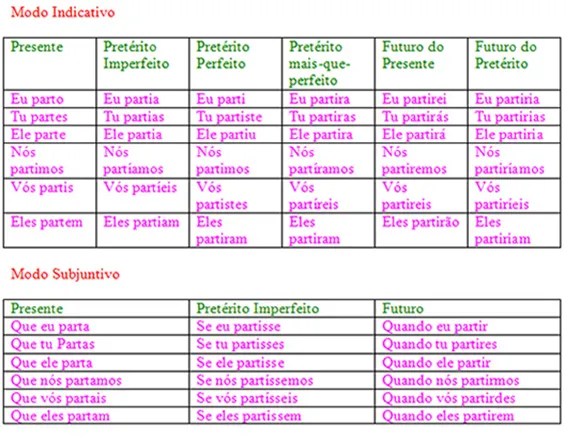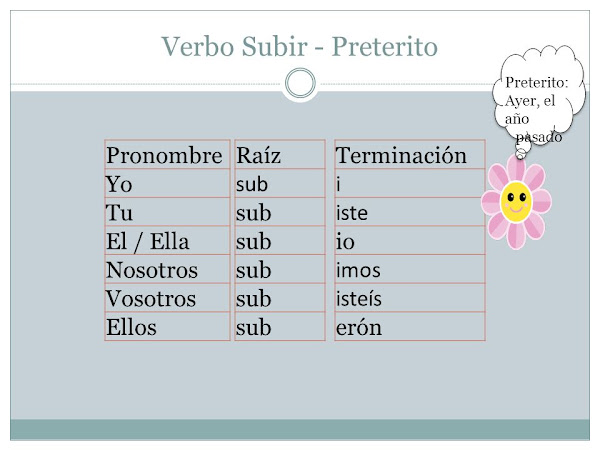Conjugação Do Verbo Ir Em Espanhol Preterito Indefinido
Conjugação Do Verbo Ir Em Portugues
Nota que na conjuga£o do verbo CANTAR, o radical se manteve em suas diversas formas. b) Irregular: when the conjugation model is violated. To determine if a verb is irregular, it must be conjugated in the present tense of the indicativo and in the perfect pretrito of the indicativo. If there is any irregularity, it will present itself at one of these two times.
Even though a pattern can be seen in the conjugation, irregular verbs exhibit distinction in a number of conjugation forms and hence are not classified as regular verbs. The difference in the radical of the word or in the flexo in any of its conjugations is sufficient to classify the verb as irregular. We'll see how this manifests itself in the first conjugation's verbs (which finish in âar), the second conjugation's verbs (which end in âer), and the third conjugation's verbs (which end in âir). £o nao parece agora... There will be more after the publicity ;)
Comi Eu N3s Comemos Voca Comeu Ele/Ela Comeu Vocas Comeram Eles/Elas Comeram Voca s3 deve identificar a parte do verbo que se manteve e adicionar estas terminaes. You probably noticed that the first person in the singular (eu) already has the letter i. Nothing will change in this case since we already have the required letra; nevertheless, you must also provide the radical for the verb you want.
Conjugation of Portuguese verbs
The majority of Portuguese verbs finish in one of three endings: -er, -ar, or -ir, and each group of verbs has its own set of conjugation rules. To conjugate a normal verb in Portuguese, you must add various terminations to the verb root depending on the person, mood, and tense. In Portuguese, there are additional irregular verbs such as "dar", "fazer", and "ir" that vary even their root throughout conjugation.
Conjugar Verbo Ir Em Espanhol
(On a daily basis, the market offers more alternatives.) Os verbos auxiliares s£o utilizados em forma de tempos verbais compostos, como os pretritos perfecto e pluscuamperfecto acima. Neles, a verbo haber n£o tem significado em si, mas só compete con an estrutura verbal. Os verbos auxiliares contenham as desinancias de nmero e pessoa gramatical, enquanto o principal verbo sempre está presente em forma nominal (infinitivo, participio ou gerundio).
https://www.spanishcircles.ca/verbos-regulares-ir
In this topic, Verbos regulares IR, you'll study and practice Spanish regular verbs that finish in IR, such as vivir (to live) and subir (to ascend). Then, in the accompanying Quizlet, you may review the flashcards. Feel free to experiment with Quizlet's many choices, such as match, learn, test, and spell. Finally, you may put your knowledge to the test by taking the Quiz.
simple o pospretrito yo ira tu iras l, ella, Ud. ira nosotros iramos vosotros irais ellos, ellas, Uds. irais yo he ido tu has ido ellos, ellas, uds. has ido nosotros hemos ido vosotros has ido vos has ido pluscuamperfectoâ Additionally, it is referred to as:pretrito pluscuamperfecto. yo haba ido tu habas ido el, ella, ud. habamos ido vosotros habais ido ellos, ellas, uds. habais ido vos habais ido ellos, ellas, uds. habais ido vos habais ido futuro perfecto yo habr ido tu habrs ido el, ella, ud. habr ido nosotros habremos ido vosotros habris ido ellos, ellas, uds. habrn ido vos habrs ido perfectamente condicionados yo habra ido tu habras ido l, ella, Ud. habra ido nosotros habramos ido vosotros habrais ido ellos, ellas, Uds. habrais ido vos habras ido Vaya nosotros vayamos vosotros vayamos ellos, ellas, uds. vayas vos vayas, *vayas imperfectoâ















